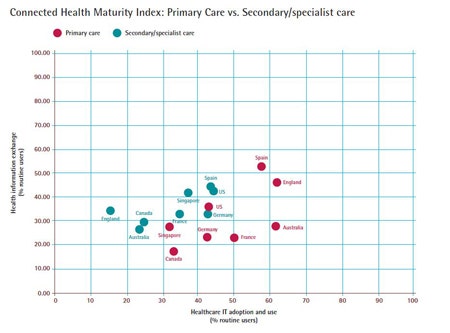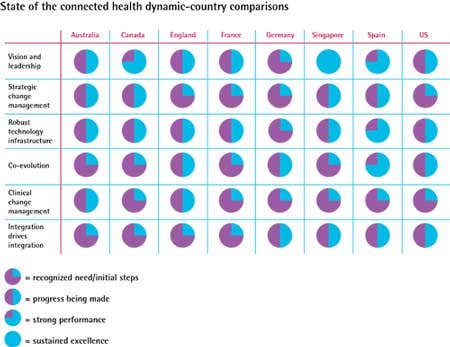February 15, 2012
U.S. Among Leaders in Healthcare IT Use and Adoption, Accenture Eight-Country Study Reports
One of Few Countries Where IT is Embraced Equally by Primary Physicians and Specialists
RESTON, VA; Feb. 15, 2012 – The United States is a leader in healthcare information technology (IT) use and adoption by physicians, according to a new eight-country study from Accenture (NYSE: ACN). The study, which includes Australia, Canada, England, France, Germany, Singapore, Spain and the United States, also shows that the United States is one of the few countries in which healthcare IT penetration is nearly equal among primary physicians and specialists.
“What is encouraging about the U.S. findings is that primary doctors and specialists are on pretty equal footing for healthcare IT adoption,” said Mark Knickrehm, who leads Accenture’s global healthcare business. “This balance and equality between the sectors will help speed integration of care delivery across the U.S. healthcare system.”
The Accenture study, Connected Health: The Drive to Integrated Healthcare Delivery, analyzed how countries and health systems are applying systematic approaches to healthcare IT. The findings are the result of more than 160 interviews with health leaders – including government officials, clinicians, health information specialists, academics and analysts – and a survey of 3,700 physicians across the eight countries as well as extensive secondary research.
Connected Health Maturity Index
(See figure 1)

The study includes the Accenture Connected Health Maturity Index, which compares the relative progress of each country’s adoption of healthcare IT (x-axis) as well as the healthcare information exchange, or HIE (y-axis) between clinicians and organizations. The index is based on physicians’ use of different healthcare IT and HIE functionalities (such as electronic entry of patient notes, e-referrals, e-ordering, e-prescribing and electronic communications with other clinicians). (Note: Accenture defines “Connected Health" as an approach to healthcare delivery that leverages the systematic application of healthcare IT to facilitate the accessing and sharing of information and the analysis of data across the healthcare system.)
The study noted differences in IT use across a variety of care settings. In primary care, for example, Spain scored the highest overall for connected health “maturity.” In fact, according to the study, 58 percent of Spanish physicians are routine users of healthcare IT functions and 52 percent regularly participate in HIE. While healthcare IT maturity in primary care was higher in England (63 percent) and Australia (62 percent), primary care physicians’ use of HIE was significantly less advanced.
Within secondary or specialist care, healthcare IT and HIE are generally less advanced than among primary care physicians, with some exceptions, notably in Singapore. The study showed, however, that U.S. and German specialists were on equal footing with their primary care colleagues. The study also showed that England had the largest gap between IT maturity in primary care – where it was a leader – and secondary care, where it lagged behind the other countries studied. The prevalence of HIE for secondary-care physicians was the lowest in Canada and Australia.
U.S. Findings Compared to Other Countries
The United States performed above several countries in the use of healthcare IT and was a leader in many capabilities of HIEs, including e-prescribing, computerized physician order entry (CPOE), e-referrals and administrative tools, according to the U.S. findings of the Accenture study.
Among the key U.S. findings:
- Approximately 62 percent of specialists are using electronic tools to improve administrative efficiency (i.e. e-scheduling, e-billing), compared to a 49 percent global average.
- The majority of U.S. physicians (59 percent) enter patient notes electronically during and after appointments, the same as their international colleagues in the study.
- More than half of U.S. primary doctors (54 percent), the most of any country surveyed, are using e-prescribing to send prescriptions to pharmacies electronically, compared to just 20 percent on average for the other countries.
- Nearly half of physician specialists (48 percent) send electronic orders (i.e. lab, radiology or diagnostic tests) compared to roughly one-third (36 percent) as a global average for the study.
- Nearly a third (30 percent) of primary and specialist physicians send and receive e-referrals for recommending care outside their organization. Independent physicians, however, were significantly less likely to make use of HIE capabilities compared to physicians who are employed or aligned with larger health systems.
“This study shows promising results among U.S. physicians,” said Knickrehm. “With a multi-billion dollar investment to further healthcare IT adoption and HIE usage, the U.S. federal government is building momentum toward what we call ‘connected health’ and recent government legislation ? including the Affordable Care Act and the American Recovery and Reinvestment Act (ARRA) ? is providing a strong impetus for change.”
Medical Data Shared by U.S. Physicians
According to the Accenture study, U.S. health systems are rapidly adopting HIE capabilities and are enabling more physicians to share and exchange patient data:
- Approximately three-quarters (74 percent) of primary doctors and specialists share patient data across their own organization to improve clinical protocols.
- Increasingly, U.S. physicians also are sharing patient data outside their organization to improve disease management. In fact, according to the study, 44 percent of specialists and 39 percent of primary doctors practice this on a regular basis.
- Approximately two in five U.S. primary doctors (38 percent) have electronic access to clinical data about patients who have been seen by a different health organization, compared to 33 percent among primary doctors on average for the study.
- Approximately 17 percent of U.S. doctors have provided patients with access to their own medical information – more than double the global average of 8 percent for all eight countries.
Comparison of Country Dynamics
To assess the progress across the eight countries studied, Accenture mapped the innovations and efforts against six dynamics of successful connected health: vision and leadership, strategic change management, technology infrastructure, co-evolutionary approach, clinical change management and integration strategy.
According to the Accenture analysis, Spain led the other countries for the dynamics of its “robust technology infrastructure” and “co-evolution.” Singapore had the best performance for “vision and leadership” and England and Australia for “clinical change management.” Germany and the United States were among the leaders in “integration drives integration.”

“A common misconception is that the one key to connected health success is having the right technology, when, in fact, there are many factors – the most important being change management and collaboration,” said Knickrehm. “Ultimately, connected health is driven by a clear vision to improve quality, enhance access to care and achieve better control of costs, which is enabled by the right technology.”
Methodology
In 2011, Accenture studied the distinguishing characteristics of healthcare IT in eight countries: Australia, Canada, England, France, Germany, Singapore, Spain and the United States.
The research entailed a literature review and more than 160 interviews with healthcare experts and health system leaders in the eight countries, including government officials, clinicians and clinical organization leaders, healthcare IT executives, and academics and analysts. Accenture also conducted an online survey with 3,727 physicians in the eight countries (approximately 500 each in Australia, Canada, England, France, Germany, Spain and the United States, and approximately 200 in Singapore), which provided comparative data on physicians’ use of different functionalities of connected health. The survey also captured attitudinal data on the perceived benefits of healthcare IT with respect to several dimensions of quality, access and cost, and explored physicians’ views on the barriers and incentives to encourage adoption and use. Finally, Accenture conducted further in-depth secondary research and consulted with academic and subject matters experts to compile a list of health systems and organizations that are widely seen to be leading the way in connected health. From that, it developed 10 case studies of health systems that represent the benchmark for good practices.
Learn more about Accenture’s Insight Driven Health.
About Accenture
Accenture is a global management consulting, technology services and outsourcing company, with more than 244,000 people serving clients in more than 120 countries. Combining unparalleled experience, comprehensive capabilities across all industries and business functions, and extensive research on the world’s most successful companies, Accenture collaborates with clients to help them become high-performance businesses and governments. The company generated net revenues of US$25.5 billion for the fiscal year ended Aug. 31, 2011. Its home page is www.accenture.com.
# # #
Contact:
Jenn Francis
Accenture Health
+ 630 338 6426